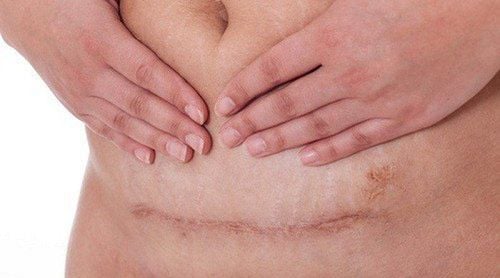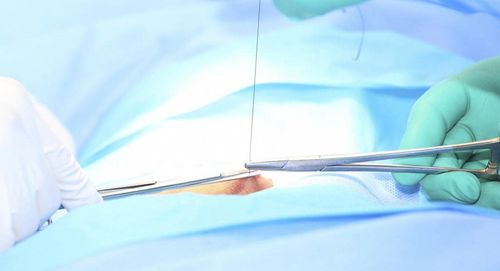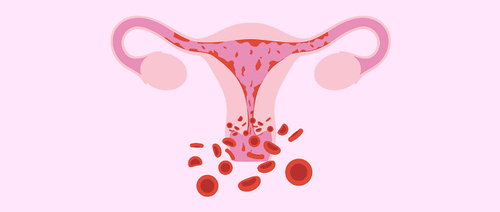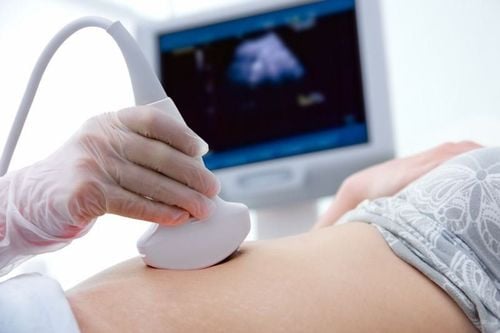This is an automatically translated article.
Vegetarian is a diet without meat, fish, eggs, many people choose to be vegetarian for religious reasons or just because they want to have a frugal diet. Vegetarianism during pregnancy brings many benefits to mother and fetus, but without a reasonable diet, it can cause serious conditions for the fetus due to lack of Vitamin B12, protein or DHA...The article is written by Master, Doctor Nguyen Nhu Thu Truc - Obstetrician and Gynecologist - Department of Obstetrics and Gynecology - Vinmec Nha Trang International General Hospital.
1. What are the advantages and disadvantages of a vegetarian diet during pregnancy?
1.1. Advantages The vegetarian menu for pregnant women often has a lot of vegetables, tubers and fruits. This helps pregnant women get rid of the obsession caused by "constipation". The fiber in vegetables helps the digestive tract work better. Vegetarian foods are all plant-based. They are all cholesterol-free and very low in saturated fat. As a result, pregnant women are not afraid of increasing bad cholesterol in the blood, preventing cardiovascular diseases. The problem that causes many pregnant women headaches during pregnancy is weight, a high-fiber vegetarian diet helps pregnant women control their weight better and can get back in shape soon after giving birth. 1.2. Disadvantages A common problem in vegetarian pregnant women, especially vegetarians, is the lack of essential nutrients, which can greatly affect the health and development of the fetus. .
2. Is it okay for pregnant women to be vegetarian?

In addition, pregnant women can use some additional foods to ensure that they have enough nutrients. A standard vegetarian diet should include a variety of fruits, legumes, and plant-based milks, along with several other important nutrients.
3. Vegetarian diet for pregnant women
During pregnancy, the mother and her unborn child have special needs. Ensure meals are full of 5 groups of essential nutrients: protein, fat, carbohydrates and vitamins and minerals. Adequate nutrients can be added in a vegetarian diet as follows:3.1 Protein (protein) Every day pregnant women need about 75g of protein. Pregnant mothers can supplement with plant-based protein, which is a source of protein with low fat content, low cholesterol, helps reduce high blood pressure, reduce the risk of cardiovascular disease. Vegetable protein sources such as:
Mushrooms: shiitake mushrooms, chicken thighs, straw mushrooms, .. Legumes: peas, lentils, green beans, soybeans.. Oats, sesame seeds, nuts chia cereals and breads made from whole grains Walnuts, chestnuts, cashews, almonds,..
Trắc nghiệm: Bạn có hiểu đúng về dấu hiệu mang thai sớm?
Các dấu hiệu mang thai sớm không phải chỉ mỗi trễ kinh mà còn có rất nhiều dấu hiệu khác như xuất huyết âm đạo, ngực căng tức,… Điểm xem bạn biết được bao nhiêu dấu hiệu mang thai sớm thông qua bài trắc nghiệm này nhé!
3.2 Calcium Calcium is important in the formation of fetal bones, in addition, a diet full of calcium helps pregnant mothers reduce the risk of pre-eclampsia, prevent high blood pressure, reduce symptoms of back pain, cramps , joint pain. If the mother's diet lacks calcium, the body will take calcium from the mother's bones to supply the fetus, leading to the risk of osteoporosis of the pregnant mother after birth.
Depending on the stage of pregnancy, the mother's calcium needs are different. The first 3 months of pregnancy pregnant mothers need 800mg of calcium/day, the second 3 months: 1,000mg/day, the last 3 months and when breastfeeding is 1,500mg/day
Calcium sources can provide pregnant mothers to eat vegetarian:
Milk, yogurt, cheese Dark green leafy vegetables: like broccoli, cauliflower, celery Sesame seeds (black sesame seeds) Soybeans Carrots In addition, pregnant mothers need to provide calcium from calcium supplements depending on your diet or stage of pregnancy as directed by your doctor.
3.3 Fats and DHA Fats play a role in building the body's structure: cell membrane structure, brain development, bone, vision, immune system, especially DHA. Vegetarians are often deficient in this nutrient because it is abundant in marine fish, fish oil. Pregnant women need about 1.4 g of DHA per day.
Vegetarian pregnant mothers can supplement DHA from algae, egg yolks, green vegetables, vegetable oils or supplement with DHA during pregnancy.
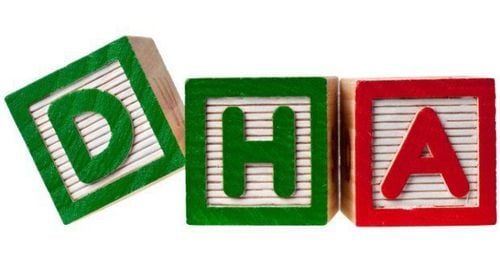
For baby: Helps prevent premature birth. For mother: Against anemia in pregnant women. The recommended iron requirement during pregnancy is 27 mg per day; not exceed 45 mg. Food sources of iron include cereals, peas, spinach, ...
Or take iron supplements for pregnant mothers as recommended by the Ministry of Health.
3.4 Folic acid and vitamin B12 Folic acid is one of the B vitamins (vitamin B9) and an indispensable element in everyone's diet. Vitamin B12 is a nutrient needed for brain development and the formation of genetic material during the first 3 months of pregnancy. Deficiency of vitamin b12 and folic acid can cause neural tube defects in the fetus and increase the risk of preterm birth.
The recommended need for folic acid during pregnancy is 800 mcg per day, vitamin B12 is about 2.6 mcg per day. Foods with rich sources of folic acid and vitamin B12 include lentils, spinach, broccoli, cauliflower, eggs, orange juice...
Also need to supplement with a supplement as recommended by your doctor. doctor.
3.5 Iodine Iodine is a trace mineral that, although needed in small amounts, is indispensable for the development of the human body. For women who are pregnant, it is necessary to supplement with adequate amounts of iodine for the good development of the fetus.
For babies: Necessary for brain and nervous system development, preventing malnutrition, mental retardation and hearing problems. In addition, iodine also plays an important role in preventing miscarriage and stillbirth. For mother: Helps healthy thyroid. The recommended iodine requirement for pregnant women is about 250 mcg, not to exceed 1,100 mcg per day. Food sources of iodine include iodized salts, yogurt, cheese, potatoes, cow's milk, peas...
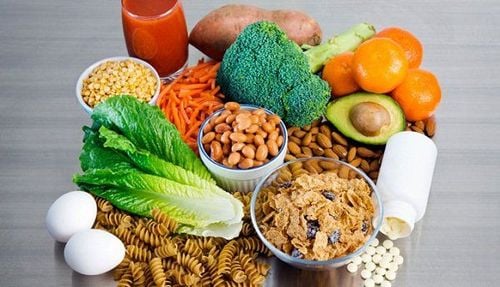
For babies: Helps brain development. For the mother: Zinc is needed for cell growth and repair as well as for energy production. During pregnancy, pregnant women need to supplement about 11 mg of zinc per day; do not exceed 40 mg. You can eat the following foods to supplement zinc: whole grains, white beans, yogurt.
3.7 Vitamin D Vitamin D is a fat-soluble vitamin that is essential for women during pregnancy.
For babies: Helps build strong bones and teeth. For mothers: Helps the body absorb calcium from food, making bones and teeth stronger. The recommended need for vitamin D during pregnancy is 600 IU; Do not exceed 4,000 IU. Vitamin D is commonly found in dairy products, orange juice, cereals and egg yolks.
3.8 Potassium During pregnancy potassium supplementation is extremely important for the health of both mother and baby. Potassium helps control blood pressure, boosts metabolism, regulates heart rate and energy.
Pregnant women should provide 4,700 mg of potassium per day. You can eat foods rich in potassium like white beans, squash, spinach, lentils, sweet potatoes, broccoli, yogurt, orange juice, watermelon, raisins...
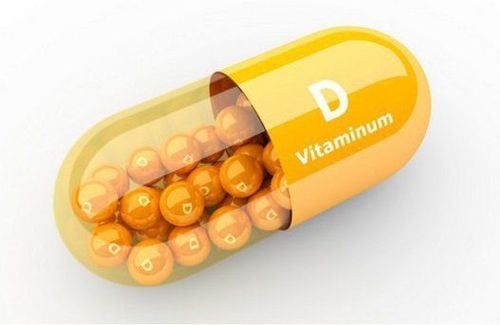
Vegetables: at least 4 servings of vegetables every day, give priority to green vegetables, give priority to fresh, steamed, boiled vegetables and limit frying. Fruits and vegetables: for soups, soups, stews or juices, smoothies Whole grains, nuts, wheat: breads, rice, cereals, pastas, dried nuts : soybeans, almonds, cashews... Soybean: use tofu to cook dishes or use dairy products Fresh milk, cheese, yogurt and eggs if used Supplement with vitamin and mineral tablets according to Doctor's guidance Hopefully the above information will help mothers have a reasonable and healthy vegetarian diet during pregnancy.
However, whenever planning to take any supplement or mineral before, during pregnancy should also consult a specialist.
Please dial HOTLINE for more information or register for an appointment HERE. Download MyVinmec app to make appointments faster and to manage your bookings easily.






